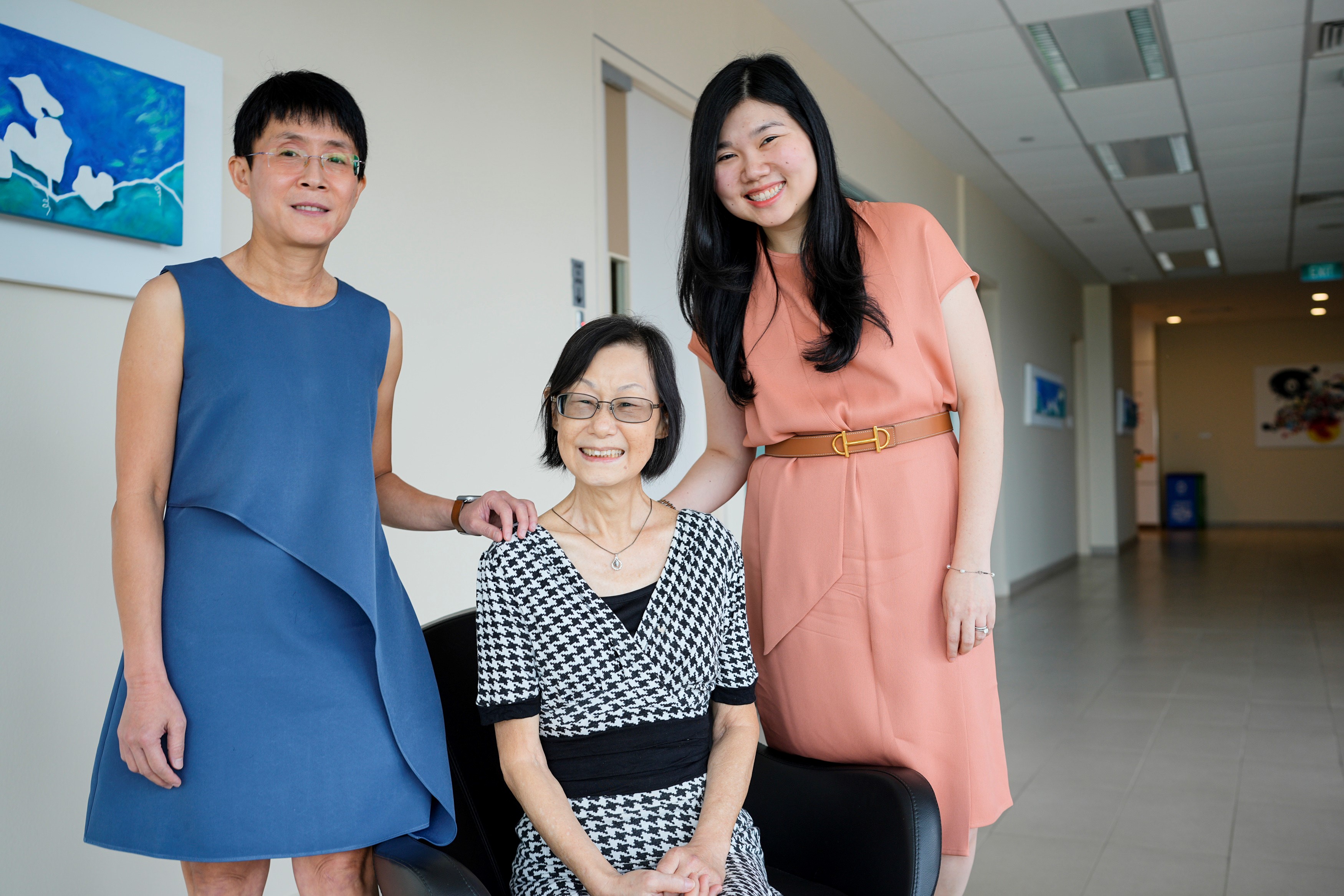
Pictured from left to right: The study's lead investigator Professor Lee Soo Chin, Madam Lim Hay Eng (seated) whose liver tumour shrank by about 30 per cent within a few months of the treatment, and NCIS Assistant Professor Joline Lim
1 in 2 advanced breast cancer patients given the combined therapy saw
either tumour shrinkage or good disease control of more than six
months
24 June 2022 - A team of researchers from the
National University Cancer Institute, Singapore (NCIS) at the
National University Hospital and the Cancer Science Institute of Singapore (CSI Singapore) at the National University of Singapore has found that a novel combination of letrozole, a type of hormonal endocrine therapy, with lenvatinib, a type of targeted anti-cancer therapy, might help those with advanced stage metastatic breast cancer achieve better control of their disease with more manageable side effects. As both letrozole and lenvatinib could be taken orally, this combined therapy could be a convenient medical course to administer to patients.
The team conducted a study that involved 43 patients with stage 4 hormone receptor positive breast cancer who had failed multiple prior therapies from September 2015 till January 2021. One in two patients who were given the combined therapy saw either tumour shrinkage orgood disease control of more than six months. Importantly, many patients were able to continue their usual daily activities and maintain a good quality of life while they were on treatment.
Lead investigator of the trial,
Professor Lee Soo Chin, Head and Senior Consultant, Department of Haematology-Oncology, NCIS, who is also Senior Principal Investigator at CSI Singapore said, “Our preclinical findings provide initial evidence that this novel combination therapy is effective in the treatment of hormone receptor positive breast cancer, even in patients whose disease are no longer well controlled on conventional endocrine therapy options. The novel combination of lenvatinib and letrozole could also benefit those with metastatic breast cancer who previously demonstrated resistance to CDK4/6 inhibitors.
Clinical trial findings could provide further insights in identifying the most appropriate patients to be treated with this combination, as well as devise strategies to overcome resistance and expand the pool of patients who may benefit from the treatment.”
Lenvatinib is a drug approved by the United States Food and Drug Administration (FDA) for treatment in cancers such as thyroid, liver, kidney and uterus cancer, but its use in breast cancer has not been proven. Endocrine therapy is the standard care treatment for stage 4 breast cancer patients with hormone receptor positive tumours. It is generally preferred over chemotherapy in patients who do not have a disease emergency, as it usually has less side effects and has a more convenient treatment schedule. Despite initial response to treatment, patients would inevitably experience disease progression and will require further treatment in order to control their disease.
Co-investigator and first author of the study,
Dr Joline Lim, Consultant, Department of Haematology-Oncology, NCIS, who is also a Joint Fellow at CSI Singapore added, “While other drugs in the same class have previously been studied in breast cancer, our study has shown more promising outcomes when lenvatinib was combined with endocrine therapy. We are the first in the world to study the combination of lenvatinib with letrozole, and it is very encouraging to see the efficacy in terms of disease control for patients with stage 4 breast cancer. In fact, the results are so encouraging there is reason to believe that this can
potentially rival the current second-line standard endocrine therapy in advanced breast cancer patients. We have started a late phase trial to directly compare the combination with the current standard treatment to prove this.”
In the long-term, the researchers hope to offer patients with stage 4 hormone receptor positive breast cancer a new effective option in their journey to control their disease. They are conducting a randomised late phase clinical trial involving up to 120 patients with stage 4 hormone receptor positive breast cancer who have failed standard first-line endocrine therapy and targeted therapy (CDK4/6 inhibitor). This study will compare the combination of lenvatinib and letrozole directly with fulvestrant – the current standard of care next line of therapy – in terms of effectiveness in cancer control. The recruitment of patient participants is currently ongoing at NCIS and there are plans to open recruitment at two other study sites in Singapore.
The preclinical and clinical studies are supported by the Singapore Ministry of Health (MOH)’s National Medical Research Council (NMRC) and the National Research Foundation, Singapore. Eisai (Singapore) Pte Ltd supported with the provision of lenvatinib.
Related: